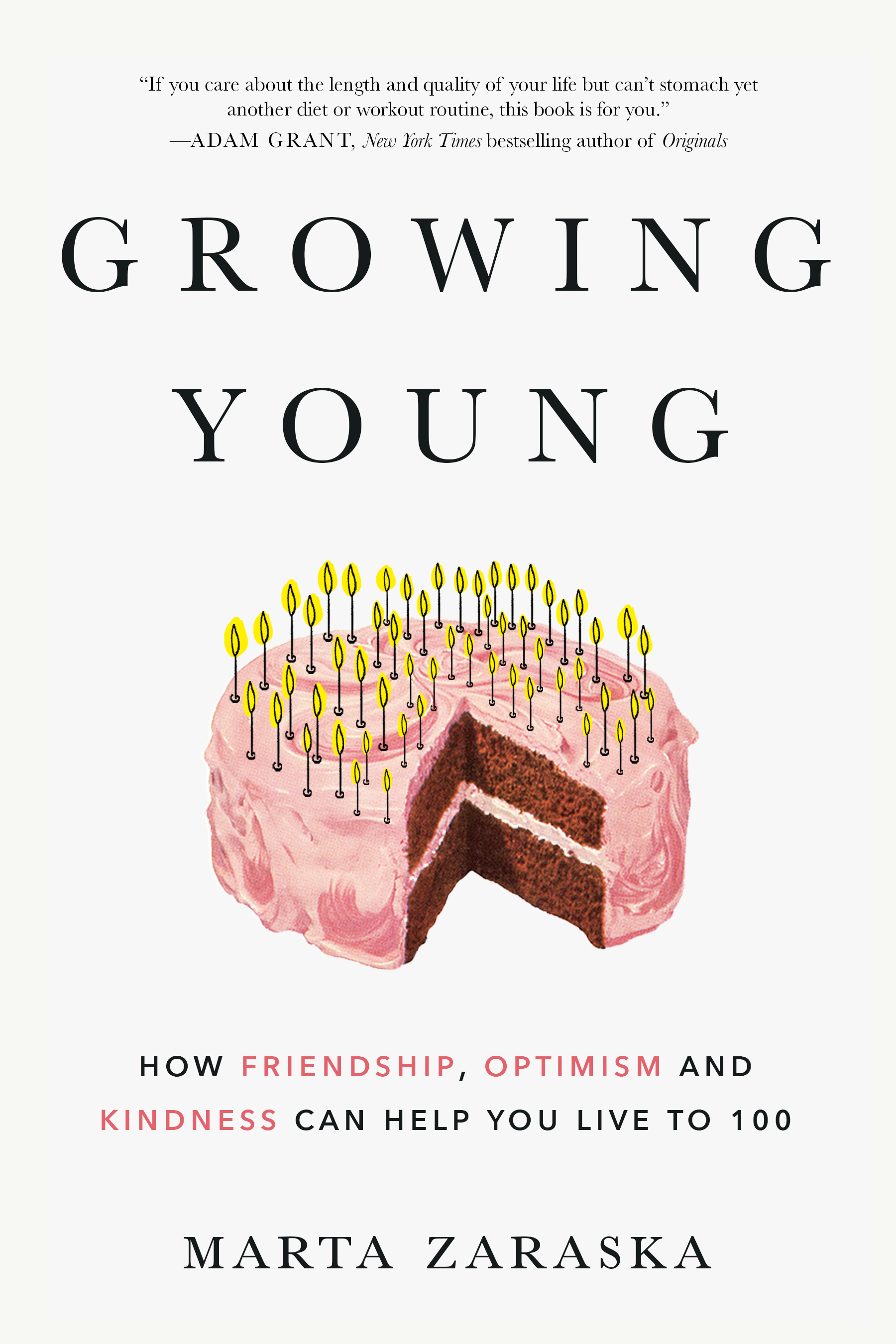I’ve always been slightly obsessed about nutrition — a predicament spurred by my profession, science journalism. Then I became a parent and my healthy-living craze went through the roof. Vitamin pills? I took them, and so did my daughter. Organics? We bought them. Kale? Goji berries? We drank them in smoothies, which I also sprinkled with turmeric. I meticulously calculated whether my child was getting enough milligrams of iron per day, of omega 3s, of magnesium. I made sure she got enough fresh air and exercise. I ran almost every day and nagged my husband to do so, too. I was certain I was doing my best to assure healthy and long lives for the members of my family.
Certain, that is, until writing my book, Growing Young: How Friendship, Optimism and Kindness Can Help You Live to 100, faced me with hundreds of research studies pointing in a very different direction — that other things mattered far more for our longevity than kale smoothies and organic broccoli. Things that I now think of as “soft drivers” of health: kindness, empathy, optimism, friendship. Studies show that building a strong support network of family and friends lowers mortality risk by about 45 per cent. Exercise, on the other hand, can lower that risk just by 23 to 33 per cent. Eating six servings of fruit and veg per day can cut the danger of dying early by 26 per cent, while for volunteering it’s 22 to 44 per cent. Omega 3-s? No effects. Goji berries? No effects, either. Turmeric, my go-to miracle food, also didn’t stand up to scrutiny. Even though quite a few trials report benefits of its chemical component, curcumin, most of them are erroneous signals. Curcumin belongs to a group of compounds called “pan-assay interference compounds” (PAINS), which tend to give false positive results because of their tendency to react with a wide variety of biological targets.
I was not alone in placing my longevity hopes in all the wrong places. Most Westerners do. As many as 20 percent of Britons use wearable technology to count their steps. Almost a half pop vitamins and minerals on a daily basis and 10 percent eat gluten-free. At the same time, loneliness is rampant, with 9 million people in the U.K. claiming to feel all alone in the world. From health and longevity perspective, that’s disastrous. Socially isolated people are up to three times more likely to die prematurely than people who are surrounded by loved ones. Loneliness kills slowly by messing with our stress response and altering the functioning of our genes. It shortens our telomeres — the caps at the ends of chromosomes that protect our DNA from degradation. What’s more, it impairs our resistance to viruses. People who experience chronic social isolation have different expression of genes responsible for the antiviral response and for antibody production, making them more susceptible to such pathogens.
In pandemic times, focusing our attention on things that don’t work well for our health, including miracle foods and miracle supplements, is particularly worrying. Some of the things we reach for to boost our immune systems may even cause us more harm than good. Excessive consumption of zinc products, for example, can lead to zinc toxicity — kidney injury, neurologic disease, and even COVID-like loss of the sense of smell. High doses of vitamin C have been linked to renal failure.
Yes, we should eat healthy and exercise to take good care of our immune systems. As Michael Pollan said, however, eating healthy is fairly simple: “Eat food, not too much, mostly plants.” Kale and chia seeds are not necessary for good health — your old-school lettuce, carrots and apples are perfectly fine. Besides, focusing on miracle foods, fad diets, and supplements takes our attention away from things that could matter far more for how resilient we are to viruses: relationships, kindness, optimism. In lab experiments, people with strong social support are less likely to fall sick if they get infected with cold viruses. Volunteering is associated with lower C-reactive protein — which, as a recent Chinese study has shown, could mean less severe symptoms of COVID-19. Happily married people, meanwhile, respond better to vaccines.
When my region of France was struck by the pandemic, I was tempted to revert back to my superfoods obsession. Blog posts and social media suggested I should prepare my body to fight the coronavirus by ingesting medicinal mushrooms, vitamin C, zinc, a herb called astragalus and turmeric (of course). I resisted. Instead, I made sure to spend quality time with my husband. I donated more money than usual. I encouraged my daughter to call her grandparents. Inspired by our neighbours, we left happy drawings of rainbows and flowers on our garbage bins, with the word “merci” scribbled across, to thank those who picked our potentially infected trash. Choosing kindness and relationships over supplements and superfoods was not only likely better for my health, but also far more gratifying. It made me feel happy and connected to my community. No amount of kale can give you that.



